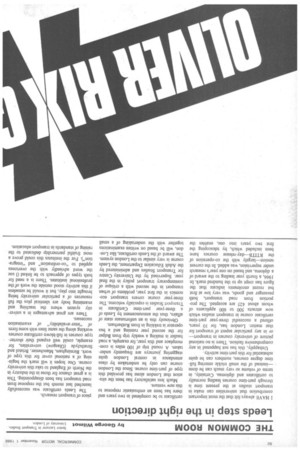Leeds step in the right direction
Page 52

If you've noticed an error in this article please click here to report it so we can fix it.
I HAVE always felt that the most important contribution that universities can make in transport studies at the present time is through part-time courses leading normally to certificates and diplomas. Certainly, in terms of volume so very much can be done —instead of the small trickle entering fulltime degree courses, numbers can be quite substantial for this part-time activity.
Unhappily, this has not happened in any comprehensive fashion. There is no national picture of university courses in transport— or in any particular aspect of transport for that matter. London has, for 10 years, offered a successful three-year part-time certificate course in transport studies which now attracts 500 to 600 applicants of whom about 425 are accepted. The proportion from road transport, both passenger and goods, was very low at first but recent enrolments indicate that the figure has crept up to the hundred mark. In 1966, a fourth year leading to the award of a diploma, and based on one year's research under supervision, was added. In the current session—largely with the co-operation of the RTITB—day-reiease courses have been included which, by telescoping the first two years into one, enables the certificate to be completed in two years and there has been an enthusiastic response to this new venture.
Much less satisfactory has been the situation that London alone has provided this type of part-time course. Since the London course can only be undertaken by class attendance in central London quite staggering journeys are frequently undertaken. A round trip of 100 miles is commonplace and this year, for example, a road haulier is making a weekly trip from Belper for the second year running and a bus operator is trekking in from Rotherham.
Obviously this is an unfortunate state of affairs, thus the announcement by Leeds of a three-year part-time Certificate in Transport Studies is especially welcome. The three-year course covers transport economics in the first year, problems of urban transport in the second with a critique of contemporary transport policy in the final year. Supervised by the University Centre for Transport Studies and administered by the Adult Education Department, the Leeds course is very similar to the London system. The award of the Leeds certificate, like London, will be based on written examinations together with the undertaking of a small piece of transport research.
The Leeds certificate was successfully launched last month but the response from road transport has been disappointing. This is a great chance for those in the industry in the North of England to take this university course. One hopes it will mark the beginning of a national cover for this type of work. Birmingham, Manchester, Bristol and Strathclyde (Glasgow) universities, for example, could well expand their shortertype courses in full-blown certificate courses working along the same lines with some form of "inter-availability" of examination successes.
There are great advantages in a university system where the teaching and examining body are identical plus the full resources of a particular university being brought into play, but it would be senseless if this activity stood outside the work of the professional institutes. There is a need for both types of approach to be linked (I use the word advisedly with the overtones applied to "co-ordination" and "integration"). For the institutes this could prove a most fruitful partnership dedicated to the raising of standards in transport education.




































































































